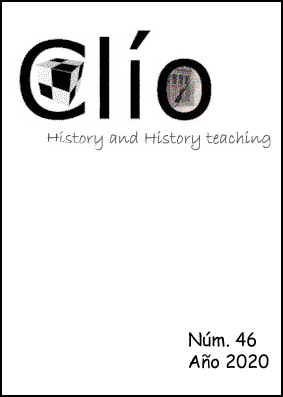Historical memory in your smartphone: five apps for teaching and learning the Holocaust
DOI:
https://doi.org/10.26754/ojs_clio/clio.2020465252Keywords:
History teaching, Historical memory, Holocaust, Apps, Mobile learnig, HeritageAbstract
Working on historical memory in the classroom, as a controversial subject that provokes social debate, is a challenge for social science teaching. Many actions have been carried out worldwide to recover the memory of those people who have been silenced for decades and who have been involved in social and political conflicts. However, there is little research that analyzes the teaching resources offered by digital technologies on the topic. This paper identifies five apps that focus on the Holocaust and analyzes their educational possibilities and their treatment of historical memory. The results show that these apps do not present an adequate teaching structure and offer a mainly informative function. However, they have specific characteristics that allow their use in educational contexts through an adequate teacher support. Regarding memory, although they present individual testimonies and memories, they disregard deliberative methodologies to confront ideas and promote a critical attitude towards the institutionalized history.
Downloads
References
Acosta, G. y Quintero, V. (2008). Memoria, cultura y patrimonio. En G. Acosta., A. Del Río, y J.M. Valcuende (coords.), La recuperación de la memoria histórica: una perspectiva transversal desde las ciencias sociales (pp. 124-136). Fundación Pública Andaluza Centro de Estudios Andaluces.
Brazuelo, F. y Gallego, D. J. (2011). Mobile learning: Los dispositivos móviles como recurso educativo. Eduforma.
Castrillo, J., Gillate, I., Luna, U. e Ibáñez-Etxeberria, A. (en prensa). Developing social and civic competence via apps: the role of historical memory in the initial teacher training. Peter Lang.
Cuesta, R. (2011). Historia con memoria y didáctica crítica. Conciencia social: Anuario de didáctica de la Geografía, la Historia y las Ciencias Sociales, 15, 15-30
Davies, I. (2000) (Ed.). Teaching the Holocaust: Educational Dimensions, Principles and Practice. Continuum.
Delgado Algarra, E. (2014). Educación para la ciudadanía en la enseñanza de las Ciencias Sociales y vinculación con las dimensiones de la memoria. Estudio de caso. Tesis doctoral. Universidad de Huelva.
Fontal, O. (2016). The Spanish Heritage Education Observatory. Cultura y Educación – Culture and Education, 28(1), 254-266. https://www.tandfonline.com/doi/abs/10.1080/ 11356405.2015.1110374
Gillate, I., Luna, U., Ibáñez-Etxeberria, A. y Castrillo, J. (2020). Historical Memory in Heritage Education apps: A Resource for Building Social and Civic Competence. En E. Delgado-Algarra y J. M. Cuenca-López (Eds.), Handbook of Research on Citizenship and Heritage Education (pp. 285-310). IGI-Global.
Gillate, I., Vicent, N., Gómez- Redondo, C., y Marín- Cepeda, S. (2017). Características y dimensión educativa en apps de educación patrimonial. Análisis a partir del método OEPE. Revista de Estudios Pedagógicos, 43(4), 115-136. http://revistas.uach.cl/index.php/estped/article/view/1793
Ibáñez-Etxeberria, A. y Kortabitarte, A. (2016). Apps, Redes Sociales y dispositivos móviles en educación patrimonial. http://www.culturaydeporte.gob.es/planesnacionales/dam/jcr:4cc8d5a2-3084-409e-a134-b46b62f7126e/appsy-socialmedia-en-educacionpatrimonial.pdf
Ibáñez-Etxeberria, A, Kortabitarte, A, De Castro, P. y Gillate, I. (2019). Competencia digital mediante apps de temática patrimonial en el marco DigComp. Revista Electrónica Interuniversitaria de Formación del profesorado, 22(1), 13-27.
Kortabitarte, A., Gillate, I., Luna, U., Ibáñez-Etxeberria, A. (2018). Las aplicaciones móviles como recursos de apoyo en el aula de Ciencias Sociales: Estudio exploratorio con el app “Architecture gothique/romane” en Educación Secundaria. ENSAYOS. Revista de la Facultad de Educación de Albacete, 33?1, 65-79.
Kortabitarte, A., Ibáñez-Etxeberria, A., Luna, U., Vicent, N., Gillate, I., Molero, B. y Kintana, J. (2017). Dimensiones para la evaluación de aprendizajes en APPs sobre patrimonio. Pulso. Revista de educación, 40, 17-33. https://revistas.cardenalcisneros.es/index.php/PULSO/article/view/252
Levy, D. y Szneider, N. (2002). Memory Unbound: The Holocaust and the Formation of Cosmopolitan Memory. European Journal of Social Theory, 5(1), 87-106. https://doi.org/10.1177/136843100200500100
López Facal, R., y Santidrián V.M. (2011). Los “conflictos sociales candentes en el aula”, Iber. Didáctica de las Ciencias Sociales, Geografía e Historia, 69, 8-20.
Luna, U., Canto Herrera, P. J., Zapata González, A. e Ibáñez-Etxeberria, A. (2020). apps, educación y patrimonio en México. Análisis de situación y estudio comparativo con el caso español. Aula Abierta, 49(1), 9-16.
Luna, U., Ibáñez-Etxeberria, A. y Rivero, P. (2019a). El patrimonio aumentado. 8 apps de Realidad Aumentada para la enseñanza enseñanza-aprendizaje del patrimonio. Revista Interuniversitaria de Formación del Profesorado, 94(33.1), 43-62.
Luna, U., Rivero, P. y Vicent, N. (2019b). Augmented Reality in Heritage apps: Current Trends in Europe. Applied Sciences, 9(2756), 1-15. http:// doi.org/10.3390/ app9132756
Olick, J. F y Robbins, J. (1998). Social memory studies: From “Collective Memory” to the Historical Sociology of Mnemonic Practices. Amn Annual Review of Sociology, 24, 105-140.
Vicent, N., Gillate, I., Campos, T. y Castrillo, J. (2020). Potencial educativo de apps de Memoria Histórica. Estudio de casos. Aula Abierta, 49(1), 35-43. https://doi.org/10.17811/rifie.49.1.2020.35-44.
Downloads
Published
How to Cite
Issue
Section
License
Copyright (c) 2020 Ursula Luna, Iratxe Gillate, Janire Castrillo, Alex Ibañez-Etxeberria

This work is licensed under a Creative Commons Attribution-NonCommercial-ShareAlike 4.0 International License.
This work is licensed under a Creative Commons Attribution-NonCommercial-ShareAlike 4.0 International License.
Copyright remains the property of authors. Permission to reprint must be obtained from the authors and the contents of JoS cannot be copied for commercial purposes. JoS does, however, reserve the right to future reproduction of articles in hard copy, portable document format (.pdf), or HTML editions of JoS.






